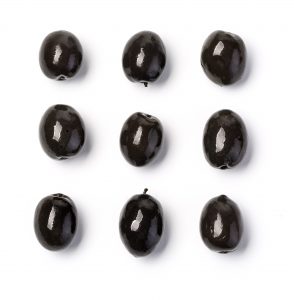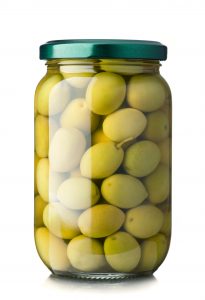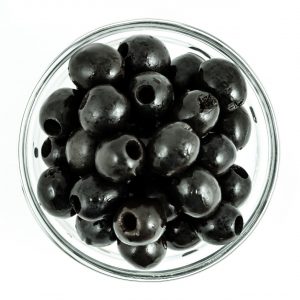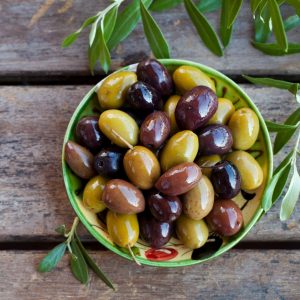Olives were first cultivated over 6000 years ago, making them one of the oldest fruits for people to eat. Today, 90% of harvested olives are turned into oil, while 10% are used entirely. The following variations of this fruit are:
- Green olives – these are harvested before ripening and are quite bitter. Olives get their bitterness from a chemical that can only be removed when they are pickled.
- Turning color olives – these are harvested just when they are about to ripen and are often brown or red. The inside of the fruit is yet to turn color. One can eat these as they are.
- Black olives – these are harvested after ripening after the olives have fully matured. They are purple, black or brown. They often lack the bitter chemical found in green olives because manufacturers neutralize it before preserving them in brine.
Here is a summary of the differences between the two main variations of this fruit:
Green – bitter taste, dense and firm, unripe;
Black – mild bitter taste, soft and pliable, ripe.
 There is a lot to be said about the nutritional value of this fruit. It is important to note that olives are 80% water, which makes them a great addition to salads. They are more popular for their healthy fat content. Oleic acid is a healthy monosaturated fat that makes up 15% of this fruit’s nutrients. It has many health benefits and is known for ensuring healthy heart function and blood circulation.
There is a lot to be said about the nutritional value of this fruit. It is important to note that olives are 80% water, which makes them a great addition to salads. They are more popular for their healthy fat content. Oleic acid is a healthy monosaturated fat that makes up 15% of this fruit’s nutrients. It has many health benefits and is known for ensuring healthy heart function and blood circulation.
These fruits are low in carbs, fiber, and proteins. Because they are cured in brine, they have a high salt content. Therefore, it is important to limit daily servings for both humans and dogs. On the bright side, these fruits offer healthy doses of micronutrients such as Vitamin E, copper, iron, and calcium to those who eat them.
The nutrients in these fruits prevent obesity, reduce the risk of heart disease, regulate muscle movement and blood clots, and ensure a healthy heart. The nutritional benefits of olives far outweigh any risks associated with their consumption. While this is true for humans who eat them, does it apply to dogs? Here is a comprehensive analysis of the suitability of olives for dogs.
What Should Dogs Be Fed?
Dogs should eat commercially prepared dog food or homemade human food that has been approved for them to eat. Commercially prepared dog food contains all the nutrients that dogs require. It also keeps for long without expiring and reduces meal prep by a considerable amount of time. Those who worry that their dog can eat something toxic should probably stick to this type of food.
Commercially prepared food for dogs to eat comes in a variety of forms: frozen, raw, canned, dry, freeze-dried, dehydrated, and fresh. It takes some experimenting to settle on which form works best for your pooch.
On the other hand, homemade food may be much safer for dogs to eat than people realize. With a worrying trade of dog food recalls some years back, it might be better to find out which human food is safe for your dog and feed him that. It takes a fair amount of research and time spent preparing the meals. Some may find the process too hectic. It may also turn out to be a costly venture.
Some examples of human food that is approved for dogs to eat include peanut butter, cooked chicken, baby carrots, unsweetened yogurt, salmon, pumpkin, eggs, green beans, apple slices, and oatmeal. Of course, one must always watch for the dogs’ reactions when they eat these foods to rule out allergies.
Olives for Dogs
 By nature, dogs are carnivores. Therefore, fruits and veggies may not be a natural part of their diet. However, after years of domestication, most dogs have developed a taste for fruits such as olives. It isn’t true for all dogs, though.
By nature, dogs are carnivores. Therefore, fruits and veggies may not be a natural part of their diet. However, after years of domestication, most dogs have developed a taste for fruits such as olives. It isn’t true for all dogs, though.
Some dogs will wrinkle their noses when offered olives to eat. Some will go as far as leaving teeth marks on the fruit only to discard it. Some might get olives into their mouths only to spit them out with disgust. As a dog owner, you might be curious and sometimes worried about this behavior. You might suspect that olives might harm your furry friend.
Are Olives Toxic to Dogs?
Olives are not harmful to dogs. You might be baffled by your dog seeming disgusted or uninterested when offered these fruits. The truth of the matter is just because something is tasty to humans, it does not mean it will be tasty to dogs. Some dogs will love olives, others will be grossed out by them, and here’s why.
You will be surprised to discover that dogs have a great sense of sight, hearing, and smell but very underdeveloped taste buds. To compensate for it, they rely on their sense of smell to tell which foods to eat. Dogs will get excited by the aromatic taste of roast beef and other delicious food. They are even excited by the smell of dog food, which most humans find gross. The smell of olives, however, can be a total turn off for dogs. Remember that olives are usually cured in a salty brine. The resulting scent is quite sharp and not necessarily aromatic to dogs.
When dogs turn their noses at olives, they are not doing it out of fear of being poisoned. They are simply saying that they would rather not eat something that has such a strong smell. Since dogs are inherently carnivorous animals that eat meat, fruits may not appeal to them as much as they do to humans.
Do Olives Have any Health Benefits for Dogs?
 One study sought to find out which nutrients your dog will choose when given a chance to pick one food out of many. Using 5 different breeds, the researches experimented with various foods to see whether dogs could regulate their consumption of different nutrients.
One study sought to find out which nutrients your dog will choose when given a chance to pick one food out of many. Using 5 different breeds, the researches experimented with various foods to see whether dogs could regulate their consumption of different nutrients.
The results showed that dogs went for foods that were high in fats and proteins and neglected those that were filled with carbs. It is a sign that dogs need fats and proteins, and all their energy that should be gotten from carbs comes from fats. How is this related to dogs’ consumption of olives?
Olives may be 80% water, but they are also 15% fats. They do not contain just any fats, they have healthy monosaturated fats. Olives are very beneficial to dogs. They promote healthy heart functions and improve blood circulation. It is not all: the macronutrients in olives promote healthy bone and teeth development in dogs.
Because olives are mostly made of water, they contribute to the health of dogs’ fur and skin. Water and healthy oils give dogs a shiny coat. However, the high sodium quantity can easily become problematic if you feed your dog too many olives daily.
Isn’t Oil Unhealthy for Dogs?
We encourage dogs to take olives but not olive oil. Having them take the processed oil is completely unnecessary. Although you can offer your dog some table scraps of food that is cooked in olive oil, the quantity is too little to cause any serious problem.
Fats are an essential part of a dogs’ balanced diet. The healthy kind of fats is found in olives. Such fats offer more benefits than harm because they are quickly broken down into energy when dogs need it.
Are There Reasons Not to Give Dogs Olives?
The only good reason not to give dogs this fruit is if they do not like it. If every time you offer olives your pet turns the nose or picks them and discards them on the floor, you should probably quit trying. Just like human beings, dogs have preferences.
Imagine waiting for a tasty treat, only to get olives, which you have already expressed your dislike for. It is even worse for dogs when they are given a treat they dislike and are told “good boy”. Ir is confusing for dogs.
Can Dogs Eat Olives Safely?
 Yes, they can. The danger posed by these fruits lies in their pits and sodium levels. When you take care of these two aspects, your dog will eat olives safely.
Yes, they can. The danger posed by these fruits lies in their pits and sodium levels. When you take care of these two aspects, your dog will eat olives safely.
The peculiarity of treats, such as olives, is that their pits pose a danger of suffocation. When eaten in large amounts, these parts of the fruit can be poisonous, and their tough exterior can break dogs’ teeth. If swallowed entirely, they will end up blocking the esophagus. Even worse, they can cause obstruction when they get to the intestines.
There is also a very unlikely risk of poisoning if dogs ingest the olive pit. Although they would have to eat a high quantity for it to happen, there is always a possibility. Because olives are so salty, letting your dog eat too many will spike the sodium levels. It will result in thirst, dehydration, and other harmful effects.
How to React When Your Dog Eats an Olive
For olives to be safely given to dogs, they must be pitted and consumed in small amounts. Considering how many food options dogs have, you can make olives a rare snack instead of a staple in their diet. Dogs should only eat olives occasionally.
Dogs are curious and will try to eat most things they come across. If he or she eats olives, do not panic. First, make sure that he did not eat any pits. Confirm whether the olives were coated with anything that can be a dog allergen. It is best to visit your vet if you have serious concerns.
Can Dogs Eat Olives Black?
Yes. These are ripe and less salty, which makes them perfect for your furry friend to eat. They have very low quantities of chemicals that often make olives taste bitter. Provided that they have been pitted and skinned, these can serve as one of the best occasional snacks for dogs to eat. Like all other olives, these black ones have been cured with brine. A dog shouldn’t eat too many of these every day.
Can Dogs Eat Green Olives?
Your mutt can eat this type of olives if they do not have any stuffing or coating that he might be allergic to. They should also be pitted and skinned to avoid all choking hazards. While these fruity snacks are great for your dog to eat occasionally, he should not eat them too often. There are many negative effects of taking food with high quantities of sodium.
Can dogs eat green olives with pimentos? Pimento peppers are a common stuffing used by people who eat green olives. They are a sweet addition that balances out the sour taste of olives. It is okay to let your pup eat olives that have pimentos.
However, not all stuffing is safe for your pet to have. Blue cheese, for example, may not be good for a pet that has lactose intolerance. Windiness, diarrhea, and a bloated stomach are warning signs of a bad reaction to stuffing.
Olives Are a Great Source of Healthy Fats
As a dog owner, you may be alarmed by your dog’s reaction every time he or she tries to eat olives. Some dogs find the smell of olives too pungent for them, and it is understandable. If your dog loves to eat olives, it is important to take necessary precautions. You should remove the pit and skin of these fruits before giving them to dogs to eat.
Can dogs eat black olives? Can they eat green ones? All olives are a source of healthy fats. These fats offer a lot of energy for active dogs. They also help maintain healthy heart functions and a shiny coat. There are many other health benefits that make it worthwhile for dogs to eat olives. And if You want best organic dog food for your dog, read our review.
 There is no straight answer to this question because the safety of olives for dogs depends on more than one factor. Generally, dogs can eat olives. However, there are some exceptions and reasons to exercise caution when feeding olives to your dog. To get a clear picture of what olives are and whether dogs should eat them, we must first understand the history and botanical identity of olives.
There is no straight answer to this question because the safety of olives for dogs depends on more than one factor. Generally, dogs can eat olives. However, there are some exceptions and reasons to exercise caution when feeding olives to your dog. To get a clear picture of what olives are and whether dogs should eat them, we must first understand the history and botanical identity of olives.

 There is a lot to be said about the nutritional value of this fruit. It is important to note that olives are 80% water, which makes them a great addition to salads. They are more popular for their healthy fat content. Oleic acid is a healthy monosaturated fat that makes up 15% of this fruit’s nutrients. It has many health benefits and is known for ensuring healthy heart function and blood circulation.
There is a lot to be said about the nutritional value of this fruit. It is important to note that olives are 80% water, which makes them a great addition to salads. They are more popular for their healthy fat content. Oleic acid is a healthy monosaturated fat that makes up 15% of this fruit’s nutrients. It has many health benefits and is known for ensuring healthy heart function and blood circulation. By nature, dogs are carnivores. Therefore, fruits and veggies may not be a natural part of their diet. However, after years of domestication, most dogs have developed a taste for fruits such as olives. It isn’t true for all dogs, though.
By nature, dogs are carnivores. Therefore, fruits and veggies may not be a natural part of their diet. However, after years of domestication, most dogs have developed a taste for fruits such as olives. It isn’t true for all dogs, though. One study sought to find out which nutrients your dog will choose when given a chance to pick one food out of many. Using 5 different breeds, the researches experimented with various foods to see whether dogs could regulate their consumption of different nutrients.
One study sought to find out which nutrients your dog will choose when given a chance to pick one food out of many. Using 5 different breeds, the researches experimented with various foods to see whether dogs could regulate their consumption of different nutrients. Yes, they can. The danger posed by these fruits lies in their pits and sodium levels. When you take care of these two aspects, your dog will eat olives safely.
Yes, they can. The danger posed by these fruits lies in their pits and sodium levels. When you take care of these two aspects, your dog will eat olives safely.